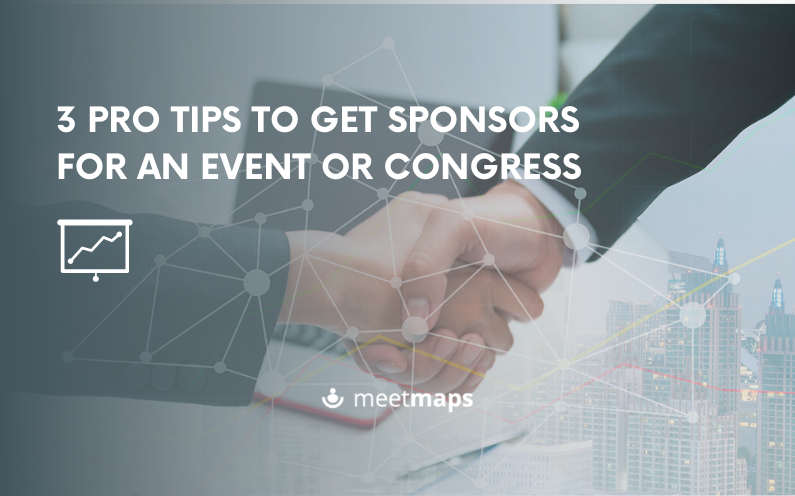If you are in the world of organizing events, congresses and conferences, you will know that the income from a sponsor can be crucial for a project to be carried out or not.
Unfortunately, getting sponsors to financially support our event can be as difficult as organizing the event itself. Especially because the skill set to organize it is completely different from the skill set needed to close a deal with a sponsor.
.
Getting sponsors is all about empathy
.
The former requires a balance of logic and creativity, with a lot of attention to detail to execute flawlessly. In contrast, securing a sponsor relies on the power of persuasion and empathy to create a compelling proposal that fits that sponsor’s specific interests.
.
Sponsors commit to well-defined events
.

In addition, sponsors tend to support well-defined events and therefore will ask for specific information to ensure that their return on investment is assured: How many attendees or ticket sales are expected, do you have any demographic information on them, who will be the speakers and other sponsors, what actions are planned to make my investment more impactful, and what will you do to ensure that my investment will have the most impact?
Although it may seem like a complicated task, finding and securing sponsors for your next event or conference can be easy if you follow these tips:
.
- Start with time and adopt a proactive attitude.
Establish a deadline of at least 6 months before the date of the event to start identifying potential sponsors is the first tip. In most cases, sponsors are large companies and their process for making these decisions is slow. Even more time will be needed if you do not have a contact person to whom you can send your first proposal.
PRO TIP: Decision makers work harder than anyone else. Therefore, it is advisable to call them before 9am or after 7pm. You are going to have a much better chance of contacting them when the switchboard is not there to defend them from the call.
.
- Pricing strategy DOES matter

Ideally you should have 3 or 4 sponsorship options with which to create various levels of value. Typically these “packs” are called diamond, gold, silver and bronze and you want to limit the higher value propositions (diamond and gold) to a few sponsors and open the cheaper options (bronze) to more sponsors. With this tiered structure you reach more sponsors with greater and lesser financial capacity while positioning diamond sponsors as VIPs.
PRO TIP: Use the popcorn strategy at the cinema. The small size is 4€, the medium size is 7€ and the large size is 8€, so for 1€ more you get twice as much popcorn. Apply the same psychology to the pricing of sponsorship packs.
.
- Create an attractive sponsorship pack
If getting a sponsor is a matter of empathy, creating a sponsorship offer that convinces them is also a matter of empathy, and you have to offer what most sponsors are looking for: to create an impact on that audience. To do this, the tendency is to follow:
- For the most economical packs, it is customary to offer brand visibility such as including the logo in mailings, in a visible place on the website or with mentions on social networks.
- For higher value packs, where brand visibility is not usually attractive, it is recommended to offer a round table, a creative workshop or even a keynote speech as it allows to generate a more direct impact among attendees.
PRO TIP: Explore the value that the event or congress app can bring in this aspect and incorporate all its options within the sponsorship packs. Ask us for a pdf of the options that Meetmaps offers in this regard and the approximate prices you can charge a client for it.
.
- Don’t forget to provide value to the attendees.
While finding and closing deals with sponsors is critical to making an impactful event, it’s not always the right thing to do just for the money. In the end, all sponsorships should add value to the attendee experience. If you don’t always act with the audience in mind, then you run the risk of diminishing the value of the event and hurting the brand.
In the same way, if we treat sponsors as collaborators and manage to create a win-win relationship, it will not be difficult for them to support us in the following events, congresses or conferences.
.
